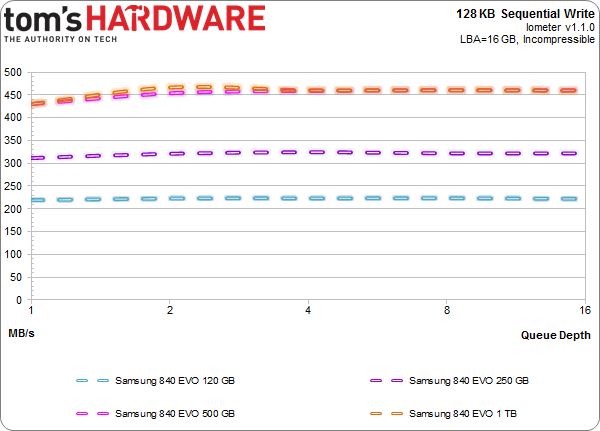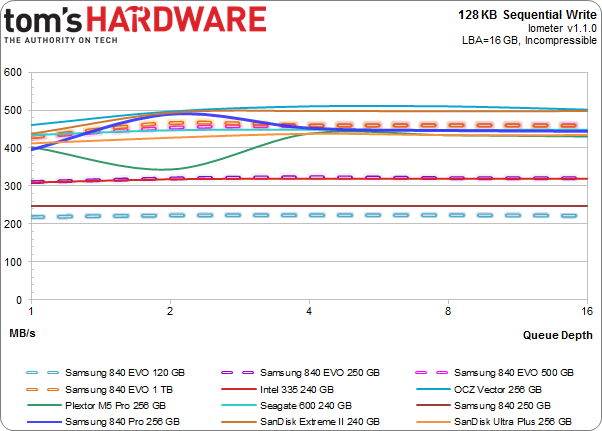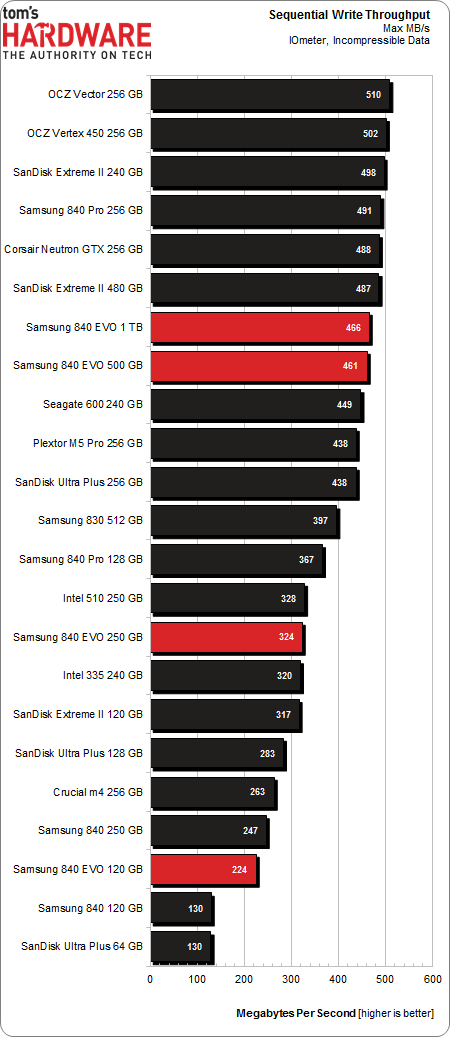Samsung 840 EVO SSD: Tested At 120, 250, 500, And 1000 GB
Last week, Samsung unveiled a successor to its wildly popular 840 at the company's Global SSD Summit in Seoul, South Korea. Stacked with a series of new features and 19 nm, three-bit-per-cell NAND, we benchmark four models and make a recommendation.
Results: 128 KB Sequential Writes
128 KB Sequential Write
This is where the analysis gets more complicated. When we tested SanDisk's Extreme II, our Iometer-based setup yielded specific, detrimental results. They weren't terrible, but we did notice that a larger-than-typical LBA range upset the drives. We suspect their behavior was attributable to SanDisk's nCache technology.
In the same way, the length of the testing at each queue depth means our results are stacked against the 840 EVO's maximum speed, penalizing the larger models due to their comparatively larger Turbo Write caches.
Take the 120 GB 840 EVO as an example. It should be hitting ~400 MB/s. But as I explained, it sets aside 9 GB of capacity to cache 3 GB of writes. Overflow is written to the remaining three-bit-per-cell memory at a slower rate. Samsung's 250 GB 840 EVO starts almost 100 MB/s faster. If we stopped this test after just a couple of seconds, though, you'd see throughput closer to 500 MB/s since the cache wouldn't be full yet.
The 500 GB and 1 TB versions can't quite hit the 500+ MB/s we'd expect because, again, we're exceeding the capacity of their respective caches. But more space set aside and additional parallelism facilitate results that come closer to Samsung's maximum specified Turbo numbers.
Somewhat unsurprisingly, the 120 GB 840 EVO butts up against the 250 GB 840. Samsung's older drive doesn't enjoy the faster controller frequency or on-drive caching. Those features help the 120 GB 840 EVO almost keep up with a vanilla 840 almost twice its size.
The 250 GB 840 EVO matches Intel's SSD 335 working on non-compressible data, and the two larger 840 EVOs nearly claim top positions through our test.
Get Tom's Hardware's best news and in-depth reviews, straight to your inbox.
Samsung's Turbo Write technology propels the 120 GB 840 EVO into a spot between the 250 and 120 GB 840s. The 250 GB 840 EVO is sandwiched between a pair of Intel drives.
The 840 EVOs don't achieve their maximum numbers in our Iometer test, but 460 MB/s certainly isn't an outcome we'd dismiss.
Current page: Results: 128 KB Sequential Writes
Prev Page Results: 128 KB Sequential Reads Next Page Results: 4 KB Random Reads-
Someone Somewhere Surely it would make sense to compare it to the vanilla SSD840. Also, there's no 840 Pro in the power charts.Reply
While the 1TB drive coming down to ~65c/GB is nice, seeing the 120 GB drives get near there would be nice. Especially since this is meant to be the value king. -
drwho1 I have 2 840 pro 512 GB SSD's (1 on my notebook 1 on my PC)Reply
I got them on a sale on Newegg for around $500 for both of them. :)
A 1TB would be cool if I find it on sale....
or maybe I should try out writing a letter to someone fat in some weird red costume...
-
slomo4sho The performance gap between the 840 Evo and 840 Pro is discouraging for the lower capacity models. I understand that the Pro is the flagship product but I was expecting less of a gap in in the 120GB models since this is a newer generation product and the 840 Pro is still based on the 21nm MLC NAND. However, the 1TB model is is a great choice for mass SSD storage. Lets hope the prices drop below $0.50 per GB soon.Reply -
Someone Somewhere MLC is faster than TLC, and bigger node NAND is usually faster. Only reason to go smaller is price and power.Reply -
SteelCity1981 I wonder if samsung plans on releasing a pro evo series since the regular series evo is to replace the older non pro versions.Reply -
razor512 ripoff, high prices for triple level flash especially at 19mm, the lifespan will likely suck and their shortened warranty represents that.Reply -
master9716 Cost for performance = Very High . ofcourse its not going to perform like a Pro but for the cost im amazed its that much better than the Regular 840.Reply -
J_E_D_70 Glad this review also refutes the perception of low TLC write endurance in normal desktop workloads. Been using a 128GB 840 in a daily-use desktop for eight months now and the endurance counter hasn't decremented at all. I'll have replaced the entire rig long before it wears out.Reply -
JohnnyLucky Interesting review. I think the point to remember is that the 840 EVO is not a high end enthusiast ssd like the 840 Pro. Instead, consider the 840 EVO as a mainstream ssd suitable for most consumer and home office scenarios.Reply


